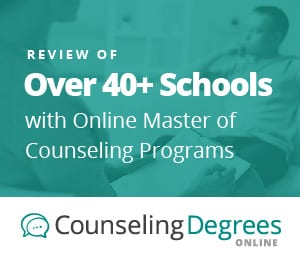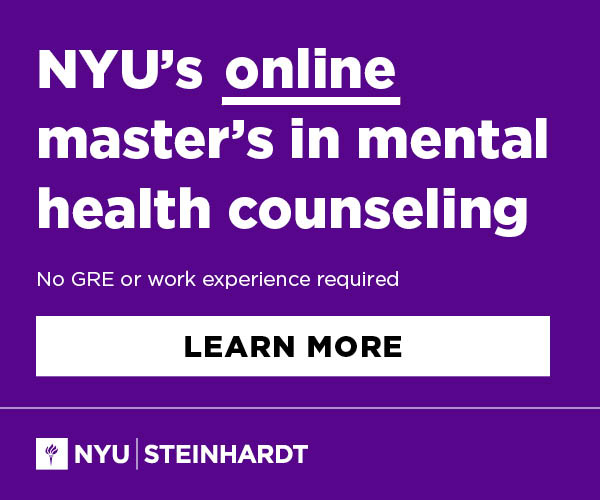 Walden University : MS in School Counseling (CACREP Accredited)
Walden University : MS in School Counseling (CACREP Accredited) Walden University : MS in Clinical Mental Health Counseling (CACREP Accredited, six specializations to choose from)
Walden University : MS in Clinical Mental Health Counseling (CACREP Accredited, six specializations to choose from)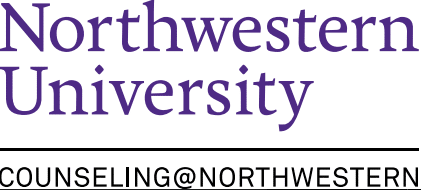 Northwestern University : Online MA in Counseling (CACREP Accredited)
Northwestern University : Online MA in Counseling (CACREP Accredited)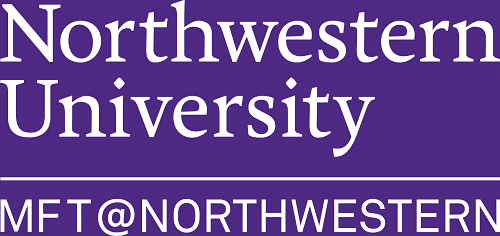 Northwestern University : Master of Science in Marriage and Family Therapy (Complete your COAMFTE-accredited MFT online program in as few as 21 months. No GRE required.)
Northwestern University : Master of Science in Marriage and Family Therapy (Complete your COAMFTE-accredited MFT online program in as few as 21 months. No GRE required.) Grand Canyon University : Master's Degree in Counseling (As a private university, GCU has the same in-state and out-of-state tuition.)
Grand Canyon University : Master's Degree in Counseling (As a private university, GCU has the same in-state and out-of-state tuition.) Liberty University : MA: Clinical Mental Health Counseling (CACREP Accredited) (Online with required intensives)
Liberty University : MA: Clinical Mental Health Counseling (CACREP Accredited) (Online with required intensives)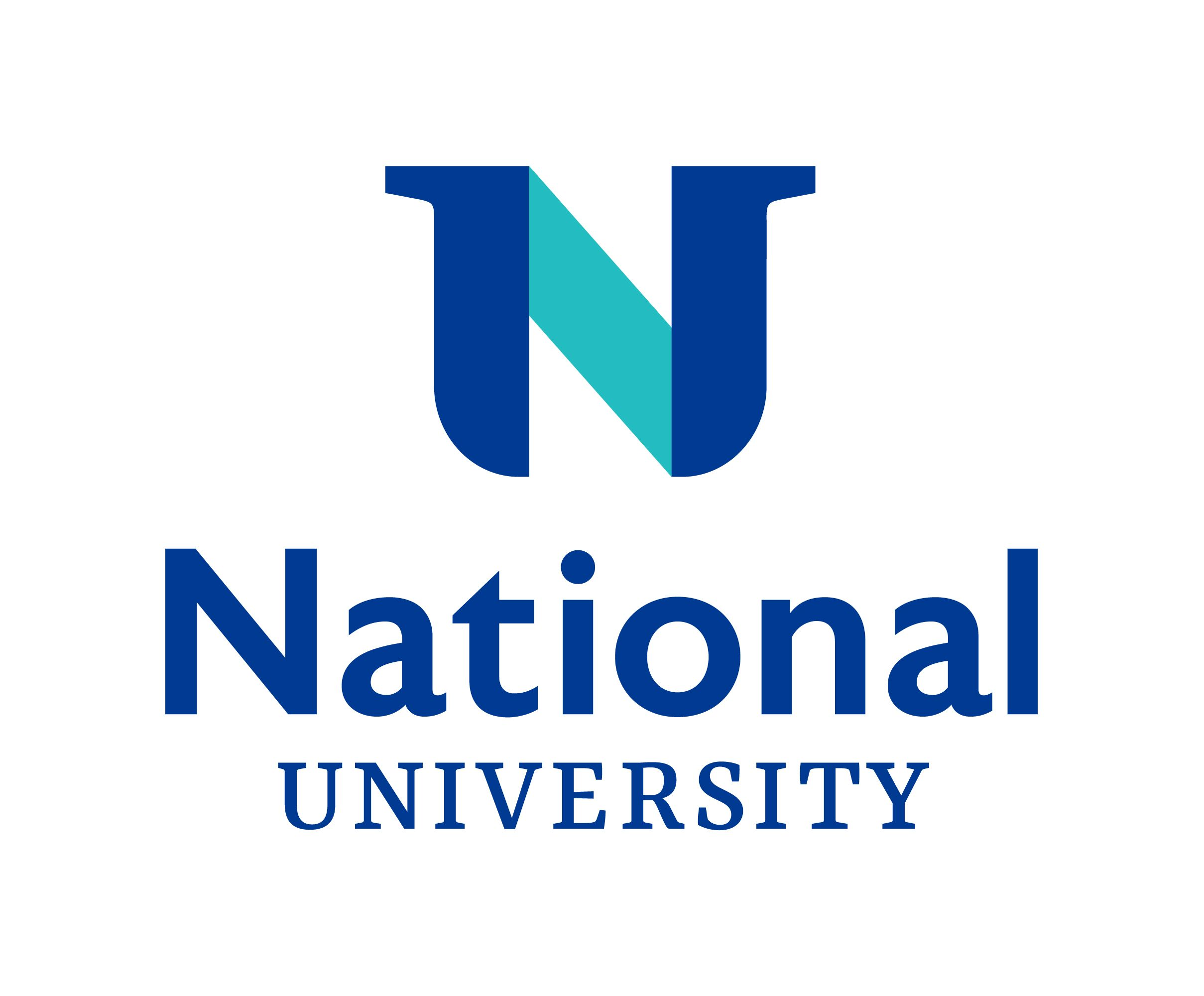 National University : Master of Science in Clinical Mental Health Counseling (Accredited. No GRE. Scholarships Available)
National University : Master of Science in Clinical Mental Health Counseling (Accredited. No GRE. Scholarships Available) University of Denver : Master of Arts in School Counseling (No GRE required)
University of Denver : Master of Arts in School Counseling (No GRE required)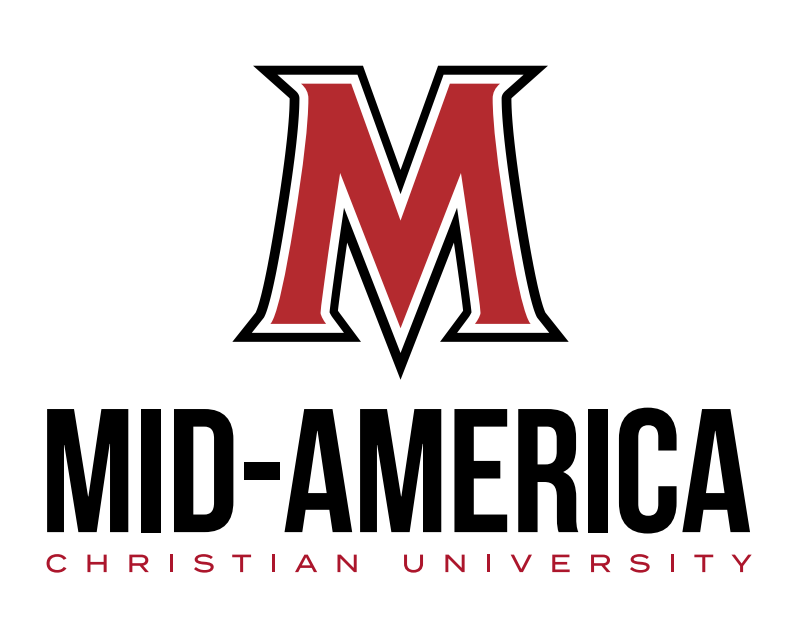 Mid-America Christian University (MACU) : Master of Science (MS) in Counseling (100% Online, No GRE Required)
Mid-America Christian University (MACU) : Master of Science (MS) in Counseling (100% Online, No GRE Required)What Is Counseling?
According to the American Counseling Association (ACA), “Professional counseling is a professional relationship that empowers diverse individuals, families, and groups to accomplish mental health, wellness, education, and career goals.”
The organization goes on to clarify that professional counselors help their clients develop and execute strategies to overcome obstacles or to achieve personal growth. More specifically, the role of the counselor may involve:
Helping patients develop coping skills
Working with patients to improve self-esteem
Providing strategies to manage the effects of mental illness
Promoting behavioral changes that can improve mental health
Counseling is a collaborative field, not only because counselors often work closely with other psychiatric health professionals (particularly when a clinical diagnosis or pharmaceutical intervention is required), but also because counselors work in conjunction with their clients to identify problems, solutions, and goals.
Consider a Featured Online Counseling Program
| School and Program Information | Online Program? Entry Requirements |
Course Information |
|---|---|---|
| Walden University
MS in School Counseling
 CACREP Accredited CACREP Accredited |
✔ Online
GRE scores not required |
School counselors help students overcome obstacles and shape successful futures. Walden’s online MS in School Counseling program will give you a solid foundation in school counseling theories, approaches, and best practices while enabling you to gain hands-on experience. Learn More |
| Walden University
MS in Clinical Mental Health Counseling
 CACREP Accredited CACREP Accredited |
✔ Online
GRE scores not required |
Mental health counselors play a valuable role in helping people cope with life’s challenges. Walden’s online MS in Clinical Mental Health Counseling program can help you become the competent, compassionate counselor you know you can be. Learn More |
| Northwestern University
Online MA in Counseling
 CACREP Accredited CACREP Accredited |
✔ Online
GRE Not Required Bachelor's Required |
Prepare to pursue licensure in as few as 18 months Learn MoreFull-time, part-time, and accelerated track options available |
| Northwestern University
Master of Science in Marriage and Family Therapy
COAMFTE Accredited |
✔ Online
GRE Not Required Bachelor's Required |
The COAMFTE-accredited MFT@Northwestern is offered by The Family Institute at Northwestern University. Full-time students can complete the program in as few as 21 months. No GRE is required, but applicants must hold an undergraduate degree. Full and part-time tracks available. Learn More |
| Grand Canyon University
Master's Degree in Counseling
HLC and NASAC Accredited |
✔ Online
|
Clinical Mental Health Counseling master's degree emphases include: Childhood and Adolescence Disorders, Christian Counseling, Marriage and Family Therapy, and Trauma. Designed to meet the academic requirements of the National Board for Certified Counselors for the National Certified Counselor credential, the Certified Clinical Mental Health Counselor credential and the Arizona Board of Behavioral Health Examiners. As a private university, GCU has the same in-state and out-of-state tuition. Learn More |
| Liberty University
MA: Clinical Mental Health Counseling (CACREP Accredited)
 CACREP Accredited CACREP Accredited |
✔ Online
Online with required intensives |
Our CACREP-accredited master’s in counseling degree online can help you become an ethical, well-trained mental health counselor with the knowledge, values, and skills you need to empower others to make positive changes in their lives. Online and on campus. Training Champions for Christ since 1971. Learn More |
| National University
Master of Science in Clinical Mental Health Counseling
WSCUC Accredited |
✔ Online
GRE Scores Not Required |
The Master of Science in Clinical Mental Health Counseling is focused on training highly skilled counselors to provide impactful and culturally sensitive mental health services in their communities. Learn More |
| University of Denver
Master of Arts in School Counseling
Designed to adhere to CACREP standards |
✔ Online
No GRE Required; Minimum GPA 2.5 Required |
Earn a Master’s degree in School Counseling online from the University of Denver. Learn from doctoral-level faculty in live classes and gain experience through mock counseling and in-field training. No GRE required. Complete in as few as 24 months. Learn More |
| Mid-America Christian University (MACU)
Master of Science (MS) in Counseling
Higher Learning Commission (HLC) |
✔ Online
100% Online |
Expand your impact with an online counseling degree rooted in faith-based practice. Mid-America Christian University offers the largest Master of Science (MS) in Counseling program in Oklahoma, with emphasis areas in addiction and substance abuse, applied behavioral science, clinical mental health counseling, and marriage and family therapy. Explore the online MS in Counseling at MACU. Learn More |
*Sponsored Counseling Programs
Online CACREP Accredited programs | Online MPCAC Accredited programs
Do Counselors Have to Be Certified?
Every U.S. state, as well as the District of Columbia and Puerto Rico, has established standards for counseling certification. While specific requirements vary by state, the intention is always the same: Counseling certification is an important way to protect public health and ensure that clients only seek mental health services from reputable professionals who’ve been properly trained and assessed. Each state has its own board that oversees the licensing process and that also manages any ethical complaints made with regard to practicing counselors.
Exemption From Certification Requirements
Counselors may be exempt from certification requirements in a few select instances. These may include the following:
- Students who are in graduate-level counseling degree programs and who are practicing under the supervision of a certified counselor
- Members of the clergy who provide counseling services in connection with their religious duties and who are tied to a credible denomination
What Is a Counseling Certification?
Counseling certification is a formal recognition provided to individuals who have met specific professional standards established by a certifying body. This certification often requires a combination of education, supervised experience, and passing a standardized exam. It serves to assure clients and employers that the counselor has attained a certain level of expertise and adheres to ethical standards. Certification can enhance a counselor's credibility and professional opportunities, allowing them to specialize and advance in their careers.
Specialty Counseling Certifications
Master Addiction Counselor (MAC)
The Master Addiction Counselor certification is designed for professionals who specialize in the treatment of substance use and addiction disorders. To earn the MAC credential, candidates typically need to hold a master's degree in counseling or a related field, have significant hours of supervised experience in addiction counseling, and pass an examination. This certification underscores the counselor’s specialized knowledge and skills in addiction assessment, treatment, and prevention, facilitating improved outcomes for individuals struggling with substance abuse.
National Certified School Counselor (NCSC)
The National Certified School Counselor credential is aimed at professionals who work within educational settings to support the academic, career, social, and emotional development of students. Earning the NCSC certification requires a master’s degree in school counseling, completion of supervised field experience specific to school counseling, and passing a national examination. This certification demonstrates the counselor's commitment to excellence in school counseling, equipped to address the diverse needs of students and foster a supportive school environment.
These certifications, among others, enable counselors to demonstrate their expertise in particular areas of counseling, thereby enhancing their professional identity and effectiveness in addressing specific client needs in specialized settings.
How Much Do Counseling Certificates Cost?
The cost of obtaining a counseling certificate can vary significantly based on several factors, including the type of certification, the issuing body, the required training and materials, and the geographical location. Here's an overview of the potential costs involved in obtaining specialty counseling certifications:
Educational Expenses: Most certifications require candidates to have completed a Master’s degree in counseling or a related field. The cost of these degree programs can range widely, from about $20,000 to $60,000 or more, depending on the institution and the length of the program.
Certification Fees: These can include application fees, examination fees, and costs for study materials or preparatory courses. For instance, application fees might range from $100 to $300, while examination fees could be in the range of $200 to $500. Some certifications might also require candidates to purchase specific study guides or attend preparatory workshops, which can add to the overall cost.
Renewal and Continuing Education: Most certifications require periodic renewal, which may involve additional fees. Continuing education courses, which are often necessary for renewal, can also entail significant expenses. Each course might cost anywhere from $50 to several hundred dollars.
Additional Costs: Other potential costs include membership dues for professional organizations associated with the certification, which can range from $50 to $300 annually. Travel expenses for attending examination sites or required training sessions can also add up, especially if they are not available locally.
To provide specific examples:
- The Master Addiction Counselor (MAC) certification process includes an application fee, examination fee, and costs for any required continuing education.
- The National Certified School Counselor (NCSC) certification may require fees for the initial certification exam, periodic renewal fees, and costs associated with obtaining the necessary continuing education credits to maintain the certification.
Prospective certification seekers should consider these costs as an investment in their professional future, potentially leading to higher earning potential and greater career opportunities. It is advisable for candidates to check with the specific certifying bodies for the most current and detailed cost breakdowns.
 Walden University - MS in School Counseling (CACREP Accredited)
Walden University - MS in School Counseling (CACREP Accredited)
 Walden University - MS in Clinical Mental Health Counseling (CACREP Accredited)
Walden University - MS in Clinical Mental Health Counseling (CACREP Accredited)
 Northwestern University - Online MA in Counseling (CACREP Accredited)
Northwestern University - Online MA in Counseling (CACREP Accredited)
 Northwestern University - Master of Science in Marriage and Family Therapy (COAMFTE Accredited)
Northwestern University - Master of Science in Marriage and Family Therapy (COAMFTE Accredited)
 Grand Canyon University - Master's Degree in Counseling (NASAC Accredited)
Grand Canyon University - Master's Degree in Counseling (NASAC Accredited)
 Liberty University - MA: Clinical Mental Health Counseling (CACREP Accredited) (CACREP Accredited)
Liberty University - MA: Clinical Mental Health Counseling (CACREP Accredited) (CACREP Accredited)
 National University - Master of Science in Clinical Mental Health Counseling (WSCUC Accredited)
National University - Master of Science in Clinical Mental Health Counseling (WSCUC Accredited)
 Mid-America Christian University (MACU) - Master of Science (MS) in Counseling (Higher Learning Commission (HLC) Accredited)
Mid-America Christian University (MACU) - Master of Science (MS) in Counseling (Higher Learning Commission (HLC) Accredited)
What to Look for in Counseling Certificates
When choosing a counseling certificate, there are several important factors to consider to ensure that the certification will meet your professional goals and enhance your credentials effectively. Here are key elements to look for:
Accreditation: The most crucial factor is whether the certification is recognized by a reputable accrediting body. For example, certifications accredited by the Council for Accreditation of Counseling & Related Educational Programs (CACREP) or the American Association of State Counseling Boards (AASCB) ensure that the program meets high educational and ethical standards.
Relevance to Career Goals: Consider how the certification aligns with your career aspirations. Different certifications are tailored to different specializations within counseling, such as addiction, school, or family therapy. Ensure that the certification will enhance your skills in the areas most relevant to your intended practice.
Prerequisites and Eligibility Requirements: Check if you meet the eligibility criteria for the certification. This may include specific educational achievements, such as having a Master’s degree, or accumulating a certain amount of supervised clinical experience.
Costs and Financial Commitment: Evaluate the total cost of obtaining and maintaining the certification, including exam fees, preparatory course fees, renewal fees, and any required continuing education courses. Consider whether the financial investment will be justified by the potential return in terms of career advancement and salary increase.
Examination Process: Understand the certification process, especially the examination requirements. Look for certifications with a clear, well-structured exam process that assesses relevant competencies and skills.
Continuing Education Opportunities: Consider whether the certification requires ongoing education to maintain the credential and what those requirements entail. This can be beneficial for staying current with the latest practices in the counseling field.
Recognition and Portability: A certification that is widely recognized by employers and can be transferred between different states or regions offers greater flexibility and job prospects.
Support and Resources: Assess the support provided by the certifying body, including study materials, preparatory workshops, and guidance on maintaining the certification. Good support can make a significant difference in your preparation and ongoing professional development.
By carefully evaluating these factors, you can choose a counseling certificate that not only enhances your professional skills but also aligns with your career goals and offers good value for your investment.
What Are the Types of Counseling Certifications?
As you weigh your options within the counseling profession, you should be aware of a few primary types of counseling certifications. Each of these certifications will allow you to play a direct role in helping clients identify and achieve goals, manage the effects of mental illness, and optimize mental health. However, these certifications can vary greatly in the types of clients you get to work with, the types of issues you address, and more.
Licensed Clinical Social Worker
If you choose to become a licensed clinical social worker (LCSW), you’ll first receive extensive training in how to identify and diagnose different mental health disorders, as well as behavioral disorders. Your training will also equip you to develop plans for treating and preventing these disorders.
Social workers who have the LCSW designation have far greater clinical training than other professional social workers, enabling them to not only counsel but also potentially diagnose.
When you become an LCSW, you’ll have the opportunity to provide treatment for individuals, families, or even groups. Counselors with the LCSW designation typically have the goal of helping their patients improve their mental health as well as their social function.
Becoming an LCSW requires you to obtain a master’s or doctorate in social work, and then complete an internship, gain supervised clinical hours, and pass a licensing exam.
Licensed Mental Health Counselor
Another option is to become a counselor who focuses specifically on assisting clients who have mental health disorders. Licensed mental health counselors (LMHCs) receive extensive education in the clinical assessment and treatment of mental health disorders, as well as in providing psychotherapy.
The specific job description of an LMHC may include the following:
Assessing and diagnosing patients who have mental health disorders
Helping clients identify their goals for personal change and development
Providing psychotherapy
Working with clients who have alcohol or substance use issues
Providing crisis management for clients whose mental health issues have intensified
Sharing strategies and general education for maintaining mental health
As an LMHC, you may choose to focus your practice on individuals or couples, on adult patients, on children, or all of the above. In addition to helping clients navigate the effects of mental illness, you may help them address everyday life issues, which can include professional anxiety, relational dysfunction, and grief.
The requirements for becoming an LMHC include earning a master’s degree in counseling or a related field, as well as completing a minimum of two years of supervised clinical practice. You’ll also need to pass a state licensing examination.
Licensed Marriage and Family Therapist
If you’re passionate about helping your clients manage healthy relationships, you may consider becoming a licensed marriage and family therapist (LMFT). In this role, you’ll focus your practice on resolving relational, marriage, or family issues, often due to underlying mental health problems.
LMFTs receive rigorous education in identifying and addressing different kinds of mental illness. However, LMFT training also includes an intense focus on interpersonal and family dynamics.
The LMFT’s role is to understand how so many individual or personal issues can be understood in the context of family or social structures and to acknowledge the ways in which an individual problem may impact a marriage or other important relationships. As a counselor in this field, you may work with your clients individually and as families or couples, providing solutions for identifying, resolving, and preventing cyclical problems or repetitive patterns of damaging behavior.
To become a counselor with this certification, you’ll need a master’s-level education, supervised clinical hours, and a passing score on your state’s licensing exam. Specific guidelines can vary by state.
Compared with other types of counselors, LMFTs are known for offering relatively short-term and cost-effective solutions, making these counselors especially popular among patients.
Substance Abuse Counseling Certifications
Some mental health professionals work with clients who are dealing with addiction issues, particularly problems with substance use. If this is something that you’re passionate about, you should know about a couple of substance abuse counseling certifications.
The two options are to become a licensed alcohol and drug counselor (LADC) or a certified alcohol and drug counselor (CADC). Both certifications will allow you to work in inpatient rehabilitation centers and other care facilities, where you can help clients develop and implement strategies for controlling the symptoms of their addiction.
An LADC can practice and make diagnoses independently. A CADC must practice under the supervision of an LADC and can help implement treatments, but may not make formal diagnoses.
In either case, you’ll need to earn a master’s-level counseling degree from an accredited program, and then work a certain number of supervised clinical hours. (The specific number can vary by state.) Becoming an LADC typically requires a higher level of education and a greater level of clinical experience — though again, this varies by state.
Career Counseling Certifications
You may decide that although you’re interested in a counseling-related profession, you’re not as passionate about working in mental health care. A good alternative is to pursue career counseling certifications in which your role will be to help clients navigate educational and career decisions, as opposed to issues pertaining to their mental well-being.
The most widely recognized certification in this field is the Certified Career Counselor (CCC) designation. In this role, you’ll spend time talking with clients, getting to know their objectives, their strengths, and their personal limitations. Based on your assessment, you’ll suggest career paths or develop strategies to help them obtain their professional objectives.
To obtain this certification, you’ll need a master’s degree or higher in a field related to counseling. You’ll also need to get a certain number of hours of supervised experience and/or complete a training course that the National Career Development Center (NCDC) administers.
Clinical Psychologist
Clinical psychologists are mental health professionals who’ve obtained a doctoral-level degree. It’s important to note that clinical psychologists aren’t the same as psychiatrists; the former involves a doctorate and the latter involves a medical degree. As such, psychiatrists can prescribe medication, while clinical psychologists can’t.
What then can a clinical psychologist do? Clinical psychologists are well trained in diagnosing, assessing, treating, and preventing mental health conditions, as well as in guiding clients to make important life changes that can improve their mental well-being. Clinical psychologists have an especially advanced level of education that may help them obtain more prestigious roles, including positions as mental health educators or practice leaders.
Psychiatrist
Among the different types of counseling certifications, becoming a psychiatrist takes the longest. Because this is a medical degree, becoming a psychiatrist requires you to complete an undergraduate degree, complete a full medical school degree, and hone your skills in a residency program. Many psychiatrists go on to complete fellowships, which allow them to further develop their mental health knowledge. Medical licensure is also required for psychiatrists to practice.
Due to this more advanced level of education, psychiatrists can provide clinical interventions that other types of counselors can’t, including prescribing medications. If you become a psychiatrist, your role will likely focus on managing different psychotropic medication treatments. You may also refer patients to other counselors, allowing them to work on their basic life skills and coping strategies in addition to pharmaceutical intervention.
- Compare Careers: Psychiatrist vs Therapist
Grief Counseling Certification
Another option to consider is a grief counseling certification. This designation shows that you’re specially trained to help clients navigate loss and bereavement.
Typically, you’ll earn this credential in addition to your other counseling certifications. In fact, there are many different vocations in which it might make sense to become a certified grief counselor. Some examples are:
- Religious officiant or member of the clergy
- Social worker, including social workers with LCSW credentialing
- Psychologist
- Marriage and family therapist
- Funeral director
Indeed, because death is such an inescapable fact of life, anyone who works in the counseling profession may benefit from gaining this added level of certification. To do so, you’ll need to complete an educational course in grief counseling. Many courses are available online, most notably from the American Academy of Grief Counseling (AAGC).
School Counselor
Another career path indirectly related to mental health is school counselor. In this profession, you’ll work in a public or private school setting counseling students through major academic decisions (including postgraduation plans) while also aiding in the development of social skills.
School counselors may also analyze data to help students identify and address behavioral issues or academic performance issues. Examples can include poor attendance or chronic tardiness. The specific role of the school counselor varies with the age of the students.
Becoming a school counselor requires a master’s degree in psychology or counseling (some school systems may prefer counseling). Different states have different systems for licensure, certification, or endorsement. Usually, these systems require a master’s degree and a certain number of hours of internship or practicum experience.
How Much Do Certified Counselors Make?
Choosing a counseling certification can significantly influence your career trajectory, not only in terms of job satisfaction but also in financial terms. The U.S. Bureau of Labor Statistics (BLS) provides comprehensive data on various counseling certifications. Here’s an updated look at the median annual salaries and projected job growth for selected counseling professions from 2022 to 2032.
Diverse Opportunities in Counseling
Counseling offers a variety of paths, each with its own financial and professional rewards:
- Marriage and Family Therapists continue to be in demand, with a median annual salary of $56,570. This specialty is expected to see a robust job growth of 15%, indicating a much faster-than-average increase in employment opportunities according to the BLS.
- Substance Abuse and Behavioral Disorder Counselors earned a median annual salary of $49,710. With a projected growth rate of 18%, this field is set to expand significantly, reflecting the increasing need for addiction and behavioral counseling services according to the BLS.
- School and Career Counselors and Advisors made a median annual salary of $60,140, with an expected growth of 5%. This rate suggests a steady demand for professionals guiding students and individuals in their educational and career decisions according to the BLS.
- Psychologists, who often require more advanced certifications, reported a median annual salary of $85,330. The field is anticipated to grow by 6%, which is faster than the average growth rate across all occupations, according to the BLS.
These figures demonstrate the varied salary potential across the counseling spectrum, and the significant job growth in these areas highlights the ongoing need for qualified counseling professionals.
How to Prepare for a Counseling Certification
If you’re interested in taking the next steps toward certification in a counseling profession, you might consider a few preliminary steps. Of course, the specifics can vary, but some basic guidelines include the following:
- Look for an accredited degree program. No matter which type of counseling you’re interested in, you’ll need to obtain a formal education, including undergraduate and graduate-level degrees in counseling, psychology, or a closely related field. Note that you’ll want a program that the Council for Accreditation of Counseling and Related Educational Programs (CACREP), the most prestigious body in the field of counselor education, has accredited.
- Don’t overlook online programs. Numerous online degree opportunities are available in each counseling field, allowing you to learn at your own pace and allowing you to choose the right program without being confined by geography. Many online programs are CACREP approved.
- Explore different options. Even if you feel locked in with a specific type of counseling, it’s always wise to consider all the options and review the basic duties and educational requirements for each counseling certification. You may even wish to talk to students or professionals in various fields as you seek the path that’s right for you.
By following these simple strategies, you should be well on your way to making a truly informed decision about your career in the counseling profession.
FAQ: Counseling Certificates
Is a counseling certificate the same as counseling licensure?
No, a counseling certificate and counseling licensure are not the same. A counseling certificate typically indicates that you have completed a specific educational program or training course, often focusing on a particular area of counseling. On the other hand, counseling licensure is a state-regulated professional designation that allows you to legally practice counseling. Licensure usually requires meeting stringent educational requirements, accumulating supervised clinical hours, and passing a state licensure exam.
Will a counseling certificate help me earn a higher salary?
While a counseling certificate itself may not directly lead to a higher salary, it can enhance your qualifications and make you a more competitive candidate for advanced positions that do pay more. Certificates show specialization and commitment to ongoing professional development, which can be highly valued by employers.
What are the benefits of getting a counseling certificate?
The benefits of obtaining a counseling certificate include increased expertise and credibility in specialized areas of counseling, such as addiction, grief, or family therapy. This can lead to enhanced job opportunities, professional recognition, and the ability to provide more effective services to clients. Additionally, certificates can fulfill continuing education requirements necessary for maintaining licensure.
How long does it take to earn a counseling certificate?
The time it takes to earn a counseling certificate can vary depending on the program and your personal schedule. Some certificates can be earned in as little as a few months, while others might take a year or more. The duration often depends on the complexity of the specialty, the course requirements, and whether you study full-time or part-time.
Consider Your Options for a Career in Counseling
Counseling can be an incredibly rewarding field, enabling you to get to know clients at a deep level, to help them address the areas they’d like to see change, and ultimately to make a positive impact on their mental health and wellbeing.
Whatever type of counseling you choose, you’ll need to start with the right academic background. Countless options for learning on-campus and online are available. Start browsing the different degree opportunities right here at Counseling Degrees Online.
Sources:
American Counseling Association, State Licensing of Professional Counselors
American Counseling Association, What Is Professional Counseling?
Better Help, “A Guide to the Different Types of Counselors”
Indeed, How to Get a Grief Counselor Certification in 6 Steps
National Alliance on Mental Illness, Mental Health by the Numbers
National Career Development Association, Certified Career Counselor (CCC)
U.S. Bureau of Labor Statistics, Marriage and Family Therapists
U.S. Bureau of Labor Statistics, Psychologists
U.S. Bureau of Labor Statistics, School and Career Counselors and Advisors
U.S. Bureau of Labor Statistics, Substance Abuse, Behavioral Disorder, and Mental Health Counselors

 University of Denver - Master of Arts in School Counseling
University of Denver - Master of Arts in School Counseling


